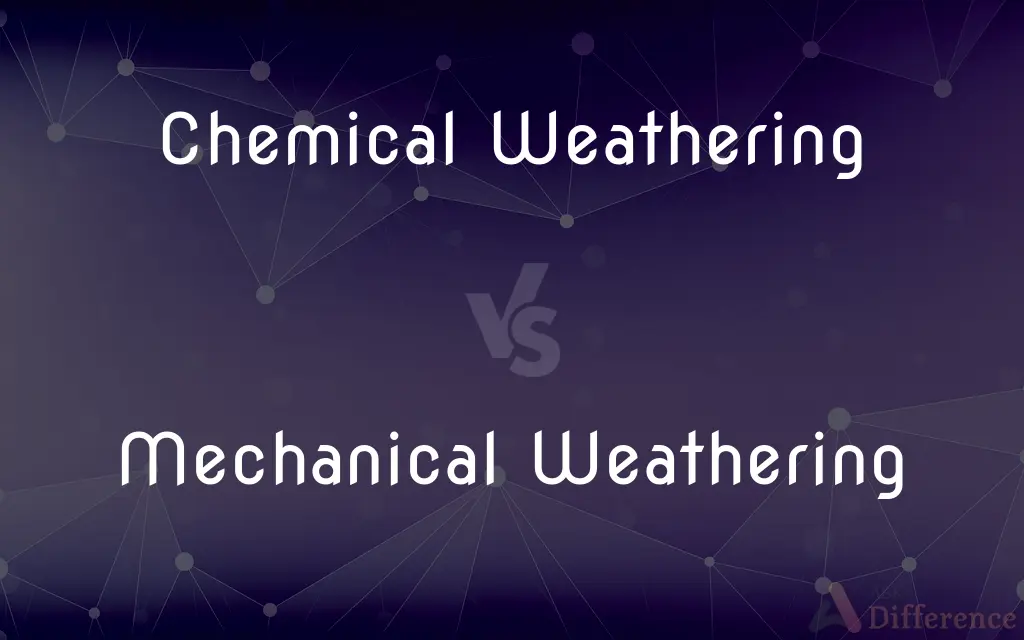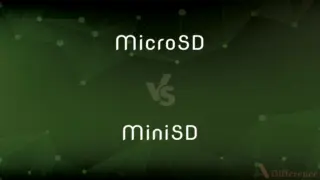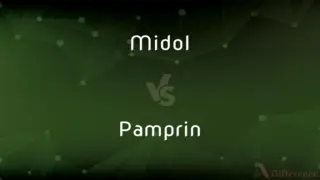Chemical Weathering vs. Mechanical Weathering — What's the Difference?
By Tayyaba Rehman — Published on December 7, 2023
Chemical Weathering alters a rock's composition, while Mechanical Weathering breaks rocks without changing composition.

Difference Between Chemical Weathering and Mechanical Weathering
Table of Contents
ADVERTISEMENT
Key Differences
Chemical Weathering refers to the process where rocks and minerals undergo changes in their composition due to chemical reactions, often because of interactions with water, oxygen, and other chemicals. Mechanical Weathering, on the other hand, involves the physical breaking down of rocks into smaller fragments without any change to the rock's chemical composition. Both processes are integral to the earth's natural processes.
Chemical Weathering processes might involve the dissolution of minerals in water or the oxidation of minerals. This often results in softer, altered rocks. Mechanical Weathering is often caused by temperature fluctuations, frost action, or plant root growth, all of which cause the rock to fragment but maintain its original composition.
When Chemical Weathering takes place, the landscape can dramatically change over time as rock materials dissolve or form new minerals. Mechanical Weathering, by contrast, might not alter the landscape's mineralogy but will change its physical appearance as rocks are fragmented into smaller pieces.
Chemical Weathering can often lead to the formation of caves, sinkholes, and other landforms as soluble minerals are leached out. Mechanical Weathering, in contrast, can produce talus slopes, rockfalls, or expansive sand dunes as rocks are broken down into varying sizes.
The agents of Chemical Weathering, such as rainwater or soil acids, actively change the rock's molecular structure. In contrast, Mechanical Weathering agents, like wind or moving water, work by physically wearing down rock surfaces without altering their innate chemical properties.
ADVERTISEMENT
Comparison Chart
Cause
Chemical reactions
Physical processes
Change in Composition
Alters rock composition
No change in composition
Examples
Oxidation, hydrolysis
Frost action, thermal expansion
Resultant Form
Caves, sinkholes
Talus slopes, sand dunes
Agents
Rainwater, soil acids
Wind, moving water
Compare with Definitions
Chemical Weathering
Chemical Weathering is the decomposition of rocks through chemical reactions.
Limestone undergoes Chemical Weathering when it reacts with acidic rain.
Mechanical Weathering
Mechanical Weathering can occur rapidly or over extended periods.
Rapid temperature changes causing a rock to shatter is a form of Mechanical Weathering.
Chemical Weathering
Chemical Weathering can make rocks softer and more prone to erosion.
Chemical Weathering of basalt can lead to the formation of red soils.
Mechanical Weathering
Mechanical Weathering physically breaks down rocks without chemical changes.
A rock splitting due to freeze-thaw cycles is an instance of Mechanical Weathering.
Chemical Weathering
Chemical Weathering involves the alteration of a rock's mineral content.
The iron in rocks can rust, a form of Chemical Weathering, when exposed to moisture.
Mechanical Weathering
Mechanical Weathering results from temperature variations, pressure, or biological activity.
The roots of a tree cracking a rock demonstrate Mechanical Weathering.
Chemical Weathering
Chemical Weathering can change the color and texture of rocks.
White marble statues darken over time due to Chemical Weathering from urban pollutants.
Mechanical Weathering
Mechanical Weathering can produce gravel, sand, or silt-sized particles.
Wind-blown sand striking rock surfaces can cause Mechanical Weathering, producing more sand.
Chemical Weathering
Chemical Weathering often results from interaction with water, oxygen, and acids.
Granite can decompose into clay due to Chemical Weathering by rainwater.
Mechanical Weathering
Mechanical Weathering often results in fragmented and angular rock pieces.
A mountain exposed to intense sun and cold nights undergoes Mechanical Weathering, producing scree at its base.
Common Curiosities
How does frost action relate to Mechanical Weathering?
Frost action is when water freezes and expands in rock cracks, causing the rock to break—a form of Mechanical Weathering.
What are some agents of Mechanical Weathering?
Agents include temperature changes, water, wind, and biological activities like root growth.
Does Chemical Weathering always make rocks weaker?
Often, yes. Chemical Weathering can make rocks softer and more susceptible to further erosion.
Can Chemical Weathering change a rock's color?
Yes, Chemical Weathering can alter a rock's color, often due to oxidation or other reactions.
Which type of weathering can lead to sinkholes, Chemical Weathering or Mechanical Weathering?
Chemical Weathering, especially when soluble rocks like limestone dissolve.
Does rain always cause Chemical Weathering?
Not always, but rainwater, especially if acidic, can cause Chemical Weathering on susceptible rocks.
What is the primary difference between Chemical Weathering and Mechanical Weathering?
Chemical Weathering changes rock composition, while Mechanical Weathering breaks rocks without altering composition.
Which is faster, Chemical Weathering or Mechanical Weathering?
It varies based on environment and rock type, but both can occur rapidly under the right conditions.
Can Mechanical Weathering be caused by animals?
Yes, animals burrowing or walking can cause rock fragmentation, a form of Mechanical Weathering.
Does Mechanical Weathering change the mineral content of rocks?
No, Mechanical Weathering breaks down rocks without altering their chemical composition.
Can Chemical Weathering occur in dry environments?
Yes, but it's typically slower than in moist environments.
Is exfoliation a result of Chemical Weathering or Mechanical Weathering?
Exfoliation, the peeling away of rock layers, is a form of Mechanical Weathering.
Is sand production a result of Mechanical Weathering?
Yes, sand can be produced when rocks are physically broken down through Mechanical Weathering.
Are rusting rocks a result of Chemical Weathering?
Yes, rusting is an oxidation process and a type of Chemical Weathering.
Can Chemical Weathering occur without water?
While water often facilitates Chemical Weathering, some reactions can occur without it.
Share Your Discovery

Previous Comparison
MicroSD vs. MiniSD
Next Comparison
Midol vs. PamprinAuthor Spotlight
Written by
Tayyaba RehmanTayyaba Rehman is a distinguished writer, currently serving as a primary contributor to askdifference.com. As a researcher in semantics and etymology, Tayyaba's passion for the complexity of languages and their distinctions has found a perfect home on the platform. Tayyaba delves into the intricacies of language, distinguishing between commonly confused words and phrases, thereby providing clarity for readers worldwide.











































